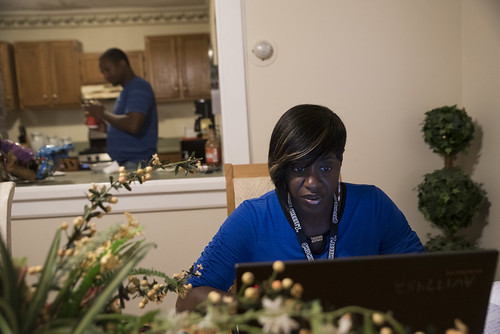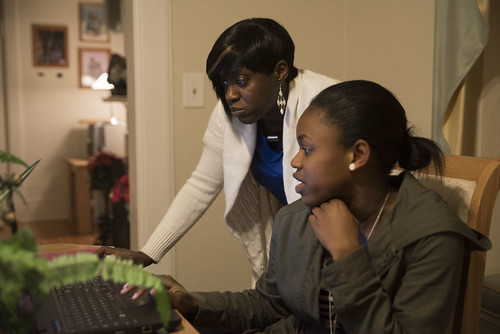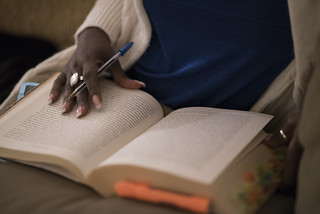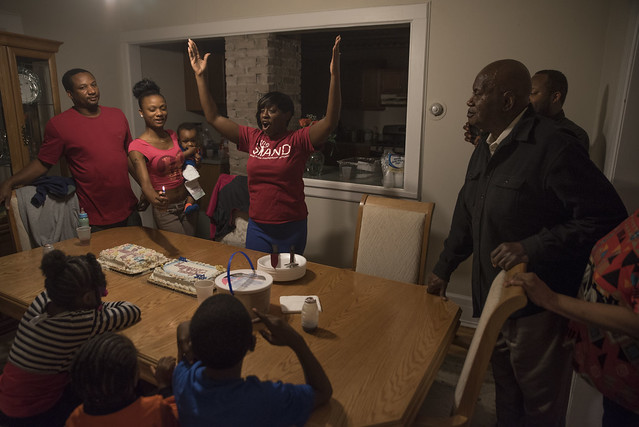Ardena Harvey decides to tell her story to help others and herself move forward in life
Driving 60 miles an hour on a six-lane highway while holding her 5-month-old son, Ardena Harvey was punched in the face by her partner, likely she recalls for something she said.
At 19, the new mother had just left her entire family in Syracuse and was starting a new life with her son’s father.
“That was the very first time he struck me,” recalled Harvey, now 39. “Something I said triggered him. Then he said, ‘you’re gonna learn today.’”
Rather than argue, Harvey went silent.

But she is silent no more. As a result of what she describes as a years-long abusive relationship, Harvey launched a support group, Virtuous Women on the Rise!
“It’s a sisterhood where we hold empowerment sessions and build a community of support,” she said. “I started it because I believe you teach what you need to learn and also because of my lack of resources being a single mother.”
Looking back, Harvey says she knew from the moment her partner struck her that the relationship would not work. She just didn’t know it would take her a decade — and many attempts — to leave.
“I knew this is not a demonstration of love,” she said. “There’s no way that someone that could confess their love for me and say they feel this strongly toward me would ever do that.”
Harvey says she left her partner the first time when the couple reached Atlanta. She withdrew $170 and walked three miles to a hotel while carrying her infant son. Her escape lasted just two nights. She returned, she says, because it was her only option.
And the abuse, which she described as manipulation, verbal putdowns and physical attacks, continued. So did the leaving. Five times, Harvey left the relationship, only to reconcile later and watch the cycle of domestic violence continue.
Tiffany Brec, a prevention educator at Vera House, which is a local support service that assists victims and families of domestic violence, notes it can take several attempts to finally sever ties with an abusive partner.
“On average it takes a victim six to eight times of leaving and going back, leaving and going back, before they are finally at a place where they are ready,” Brec said. “This is about the average, but the timeframe on how long this could take is dependent on the person and situation.”
LOVE BLIND
Between the gap of graduating high school and leaving for freshman orientation at University at Albany, State University of New York, 17-year-old Harvey met the future father of her two children and her abuser. He lived behind her family’s Kennedy Square townhouse. She said the connection was instant; he was intriguing and seemed wise beyond his years.
 “His conversation was so different than the men my age,” she said.
“His conversation was so different than the men my age,” she said.
He told Harvey he was 21, that he had one son and that he was a student at Syracuse University. Yet in reality he was 26, had given her one of many alias names he used, had multiple children and had falsified documents, claiming to be an SU undergrad.
“I fell in love with a fictitious person,” she said.
He was well-spoken, she said. He introduced her to new schools of thought about religion and wellness, and he challenged her to stop eating pork.
Later she recognized this as manipulation. She dropped out of college — after having transferred to Le Moyne College — because she says he purported it as a white man’s education. And by this point, she was pregnant.
“It was understood that we would be married and start a family,” she said.
A ceremony was performed in his mother’s living room and attended by one witness; a few months later, the pair left for Georgia with their new son. Harvey knew deep inside it was not the relationship she wanted. She never mailed in the marriage license. And it was years later before she told anyone the union wasn’t legal.
VICIOUS CIRCLE
The challenge for Harvey in separating was her children. She had her second child two years after arriving in Georgia.
“He didn’t believe in using birth control or condoms,” she said.
The National Coalition Against Domestic Violence reports that adolescent pregnancy and unintended pregnancies are linked with intimate partner violence, along with anxiety and post-traumatic stress disorder, as well as an increased risk of contracting sexually transmitted diseases.
With a toddler and infant, she wanted her family to work.
“I wanted my children to have their father,” she said, “and I really thought he could change.”

There was a process she set up for leaving.
The first step was to ensure she could care for both children independently. “I literally had to practice catching public transportation with two children. When I felt comfortable that I could live on my own, then I would sneak out,” she explained.
She also would have to line up baby sitters, secure housing and oftentimes borrow money.
Without doubt, they would reconcile.
“He’d say, ‘I’m sorry,’” she said. “I really believed that he didn’t mean to do it. I don’t blame him because I really wanted our family to work. But once I established my independence, I was comfortable that if it doesn’t work, I know how to do this on my own.”
FED UP
By 2001, she returned to Syracuse after fleeing the relationship.
“I grabbed a garbage bag full of clothes for the kids, got into my little Ford Aspire and just drove,” she said. “I’ve never driven long distance by myself. I didn’t have a map or directions; I was going to see how far I could go. I started driving, then saw I had made it to another state.”
I started driving, then saw I had made it to another state.”
And she kept driving — straight up Interstate 81.
“I unexpectedly knocked on my parents’ door,” she said.
They were totally surprised, she said, because she never told anyone about abuse in her relationship.
Nationally, 1 in 5 women have been victims of severe physical violence by an intimate partner during their lifetime, according to the National Coalition Against Domestic Violence, and women between the ages of 18 and 24 are most commonly abused by a partner.
At that time, Harvey was 24, her son, Yahkeef Davis, was 5 and her daughter, Na’amu Harvey, was 3.
“But again we tried to reconcile,” she said, and the family got an apartment together only a few months after she arrived in Syracuse.
It was a final assault a year later that compelled her to leave for good.
“I don’t remember much else that happened that evening after the assault in the bathroom, but I do remember for the next few days I was strategizing how to leave.”
DIVINE INTERVENTION
Each day, Harvey reads a passage from “Until Today!: Daily Devotions for Spiritual Growth and Peace of Mind” by Iyanla Vanzant. On Jan. 17, 2002, she read a passage that told her: You’re going to have to do something that you don’t want to do, but you have to do it for all the women in your family.

“In interpreting that spiritual message, I thought I had to shoot him,” she said. “Not to kill him. But to maim him, to let him know that you cannot abuse people like that and get away with it.”
Extreme thoughts like this had never entered her mind and, she says, have never returned. “I didn’t see another way out. If I shot him in the leg, then maybe he’d become paralyzed and couldn’t chase me. I felt like I was in a hopeless situation.”
She developed a plan.
She would go to work at Carrier like normal. She’d take a break to drive to the bank and was prepared to withdraw $1,000. She’d next walk up to any crowd of guys on the street and ask to purchase a gun.
The morning she was prepared to do all of this, her car would not start.
“He had to take me to work,” she said. “That threw a monkey wrench into my entire plan.”
By being dropped off at work, she had no car and no way to travel to the bank, no way to obtain a gun.
“My car has never not started,” she said. “Just that particular morning. It really had to be a divine intervention, because the very next day, it started up.”
A few days later when he left for work, she packed up her things and moved back in with her parents, into the same three-bedroom townhouse where she grew up. She shared a bedroom with both her children. She worked two jobs and saved $18,000 in less than a year, using that money as a down payment to buy her own home.
Her son recalls those times. “I didn’t mind us all living together,” Davis said. “I was an affectionate kid, and I loved being close to my mom. And when we got a house, it was exciting. I remember the first night there. We didn’t have any furniture, so the three of us all slept on the dining room floor layered in covers and sheets.”
Looking back, Davis can remember wanting his dad around, but he supports his mother’s decision to leave the relationship. (His dad is now in prison.)
“I think she made a good decision,” he said. “Although I was without a father for a majority of my life, she didn’t feel comfortable in that relationship. I feel she had every right to leave. It’s not like she said he couldn’t come and see us, he just didn’t. I think she was completely justified in her response.”

SURVIVAL STORY
Harvey kept the abuse a secret over the years, but at least one person noticed. “Only once did I allude I was in an abusive relationship. While we were moving around in the South, a leasing agent looked at me and said ‘I can tell that you are suffering and if there is anything you want to talk to me about, and I mean anything, I am here.’”
Harvey said she didn’t acknowledge anything at that time. “But I also didn’t disacknowledge. I just sat in silence.”
Looking back, something about how that woman showed concern inspired Harvey to become vocal later in life.
“I wish I remembered her name,” Harvey said. “She doesn’t know how much that question touched me.”
In a 2010 National Intimate Partner and Sexual Violence survey, it was estimated that 41 percent of African-American women living in the United States were victims of physical or sexual abuse and/or stalking by an intimate partner and that African-American women suffer at a disproportionate rate.
According to researcher Catherine A. Kendall in her 2014 study, “Deconstructing the Universal Woman,” many domestic violence social programs are based on the needs of white, middle-class women; thus it marginalizes women of color, who are in the greatest need of help. The result, she reported, is that many victims do not seek help or speak out.
Harvey utilized no services.
 But, now, her support group provides services for others, and it has helped her, too. Because of Virtuous Women on the Rise!, Harvey was able to return to school. She completed a bachelor of science in business administration from Columbia College at Hancock Field in Syracuse. She also earned a master of social work from the David B. Falk College of Sport and Human Dynamics at Syracuse University.
But, now, her support group provides services for others, and it has helped her, too. Because of Virtuous Women on the Rise!, Harvey was able to return to school. She completed a bachelor of science in business administration from Columbia College at Hancock Field in Syracuse. She also earned a master of social work from the David B. Falk College of Sport and Human Dynamics at Syracuse University.
Harvey now works as a Promise Zone Program supervisor, which is an external partner with the Syracuse City School District. She works at the central office off Harrison Street and supervises Promise Zone specialists. Their focus is on matching students with resources to address their social and emotional challenges.
Joining Harvey’s group was a way for Geneva Fortune to heal from abuse she witnessed her sister endure, as well as a few of her own volatile relationships. “We would come together and be there for each other,” Fortune said of the women in the group. “And then there were times we would take each others’ kids to make sure that they could do what they needed to do — work or attend classes.”
Fortune also says Harvey’s drive to achieve her education pushed her. At 56, Fortune has recently returned to college to complete a bachelor’s degree in social work at Cayuga Community College. “Her motivation to move on and keep going inspired me,” Fortune said.
A goal of Harvey’s is to work with women who have been in domestic and/or abusive relationships. As a certified life coach, she hopes to help them identify the lesson or the blessing in that traumatic experience. And another goal is a book.
“I’m currently writing a book based on my relationship with him and based off of other defining relationships I’ve had.”
Her commitment is to have the published book in hand by her 40th birthday — Oct. 7, 2016.
“In retrospect, there’s always a lesson and a blessing in that abuse,” she said. “It’s here to teach us something. The lesson I learned was forgiveness.”
— Article by Ashley Kang, The Stand’s director
 The Stand Syracuse
The Stand Syracuse


